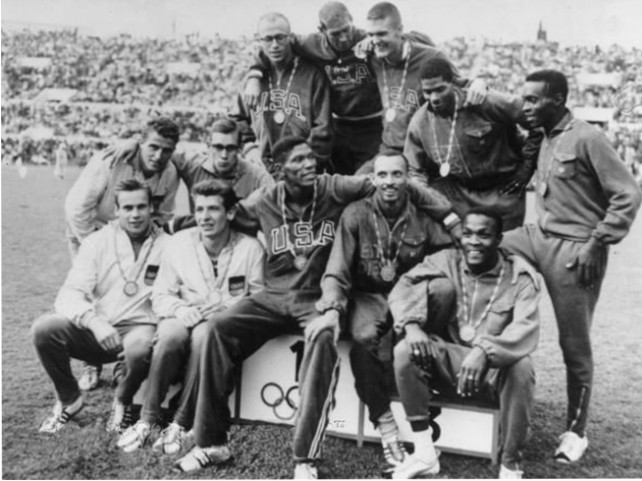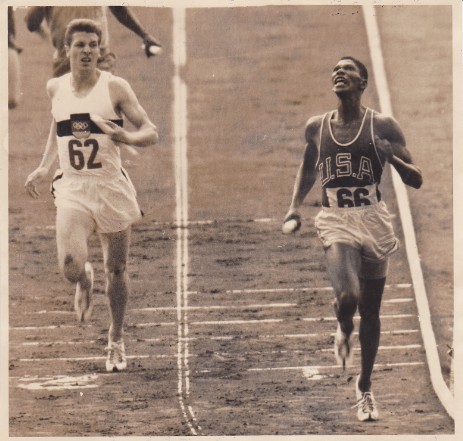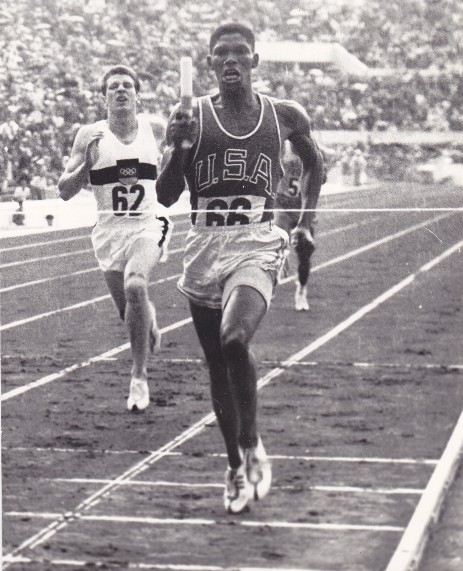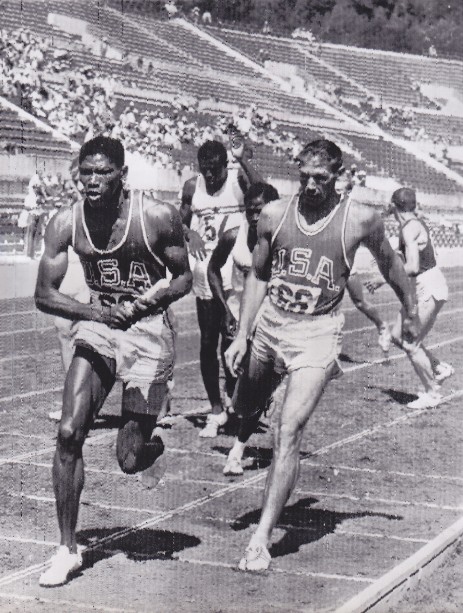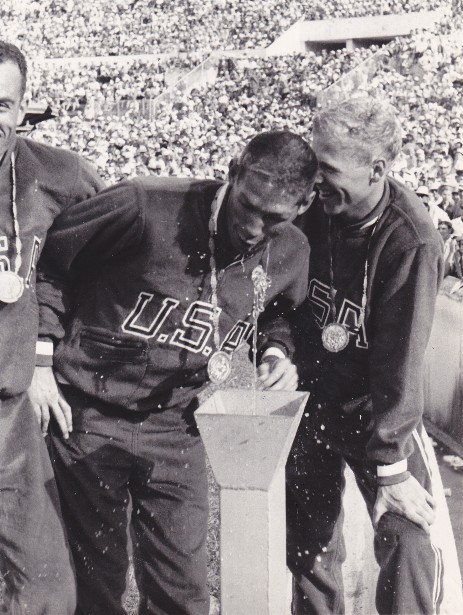Le staffette
STAFFETTA 4 x 100 FEMMINILE
La finale dei 100 metri aveva sei nazioni finaliste, quindi nessuna squadra poteva essere considerata dominante. Ma gli Stati Uniti avevano Wilma Rudolph, che aveva vinto abbastanza facilmente le medaglie d'oro dei 100 e 200. L'intera squadra statunitense era rappresentata dai corridori della Tennessee State University, soprannominati i Tigerbelles. Dopo tre tappe, i tedeschi erano in testa alla squadra americana, con Rudolph che riceveva il testimone due metri dietro. Ma ha superato l'ancora tedesca Jutta Heine per dare agli Stati Uniti una vittoria di tre metri, con Rudolph che ha vinto la sua terza medaglia d'oro.
The 100 metre final had six nations finalists, so no team could be considered dominant. But the United States had Wilma Rudolph, who had won the 100 and 200 gold medals quite easily. The entire US team was represented by runners from Tennessee State University, nicknamed the Tigerbelles. After three legs, the Germans were leading the American team, with Rudolph receiving the baton two metres behind. But she cruised past German anchor Jutta Heine to give the US a win by three metres, with Rudolph winning her third gold medal..
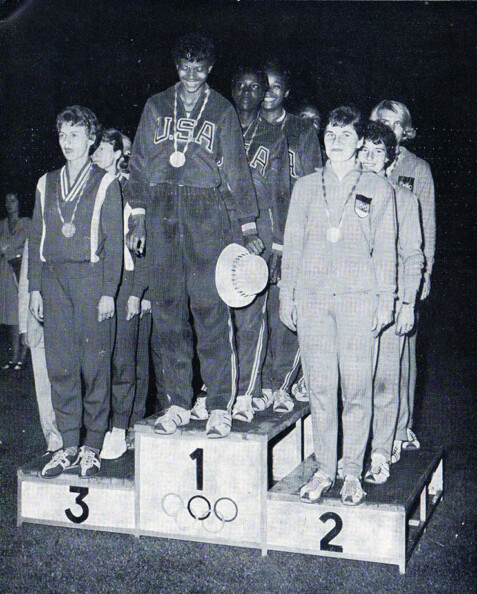
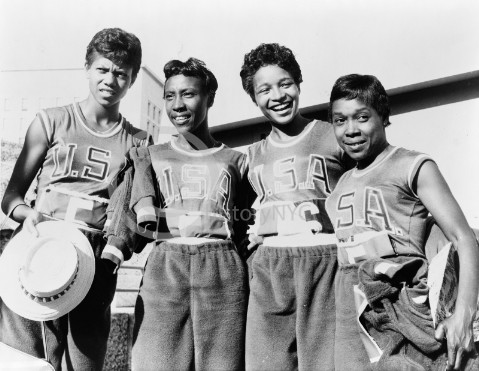
Lucinda Williams, Martha Hudson, Wilma Rudolph, Barbara Jones
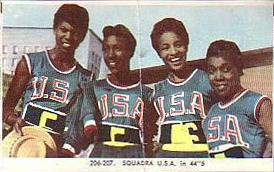
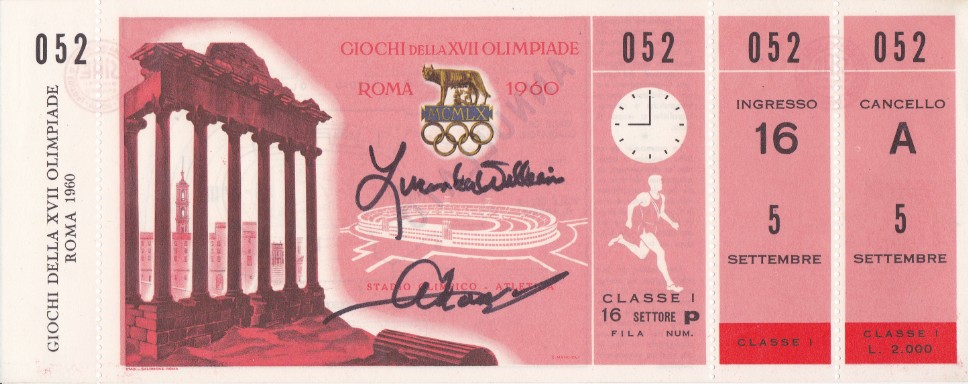
STAFFETTA 4 x 100 MASCHILE
Gli Stati Uniti e la Germania erano le squadre più forite e lo dimostravano i tempi conseguiti da entrambi i team durante le qualificazioni (39,7 gli USA e 39,5, record del mondo, i tedeschi). In finale l'americano Frank Budd partì velocissimo, guadagnando un po di vantaggio sugli avversari, ma il cambio con il secondo staffettita, Ray Norton, venne fatto fuori dalla zona. A quel punto, passarono avanti i tedeschi con Armin Hary (il campione dei 100 metri) che con la sua classe permise al suo compagno Lauer di partire con un vantaggio di quasi due metri su Dave Sime. Sime, recuperò tutto lo svantaggio e tagliò il traguardo al primo posto con il record del mondo (39,4). Ma gli Stati Uniti, a causa di quel cambio fuori zona, vennero correttamente squalificati, e la medagia d'oro andò ai tedeschi. Argento per i sovietici e bronzo per la Gran Bretagna.
As always, the USA was favored but the German team, led by 100 metre champion Armin Hary and top hurdler [Martin Lauer], was expected to challenge them. And in the first round, Germany equaled the world record with 39.5. In the final, Frank Budd opened for the US, and quickly pulled away, but the changeover to Ray Norton was made clearly out of the zone. Norton slowed dramatically, trying to keep the exchange legal, and the Germans went ahead, although Norton had a slight lead by the second exchange, outrunning Hary. Another poor exchange occurred however, and at the final exchange, Lauer had a two-metre lead on Dave Sime. Sime ran one of the great anchor legs to bring the US home in what was at first thought to be a world record 39.4 (39.59). But the US was properly disqualified and the Germans won the gold medal. Silver for the Soviets and bronze for Great Britain.
Bernd Cullmann, Armin Hary, Walter Mahlendorf, Martin Lauer
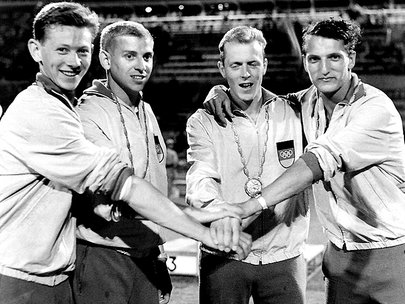

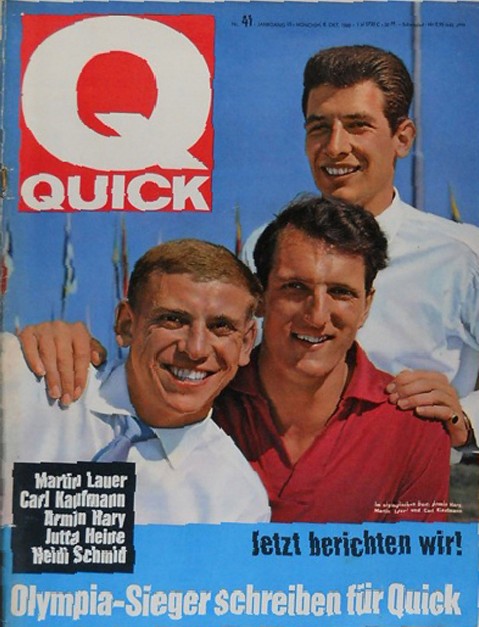
STAFFETTA 4 x 400 MASCHILE
Guidati Otis Davis, oro nei 400 metri Otis Davis e Glenn Davis, oro nei 400 ostacoli, gli Stati Uniti erano i favoriti di questa gara. Per gli USA parti Jack Yerman in prima batteria, prendendo subito il comando. Dopo tre cambi, con gli Stati Uniti in vantaggio di circa otto metri sulla Germania, prese il testimone Otis Davis, dietro di lui il tedesco Carl Kaufmann, che aveva perso per poco l'oro dei 400 proprio con contro Davis. Kaufman riuscì a recuperare un po di metri ma non abbastanza per agganciare l'americano. Gli Stati Uniti vinsero la gara con un vantaaggio di oltre mezzo secondo, battendo anche il record del mondo (3:02.2). La medaglia di bronzo, a sorpresa, venne vinta dalla squadra delle Indie Occidentali
Led by 400 metre gold medalist Otis Davis and 400 hurdle gold medalist Glenn Davis, the US was favored in this event. Jack Yerman led off for the US and took the lead with 46.29. After three legs, the US led by about eight metres over Germany, when Otis Davis took the baton. Germany's anchor was Carl Kaufmann, who had narrowly lost the 400 gold to Davis. With a comfortable lead, Davis was slightly outrun by Kaufmann, who actually closed in the first 200 metres, but the outcome was never in doubt, the US breaking the world record in 3:02.2 and winning by half a second. The bronze medal, surprisingly, was won by the West Indies team.
